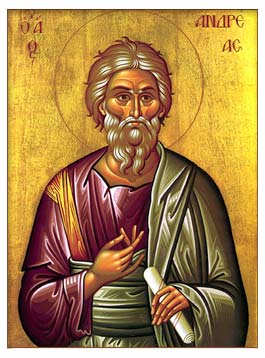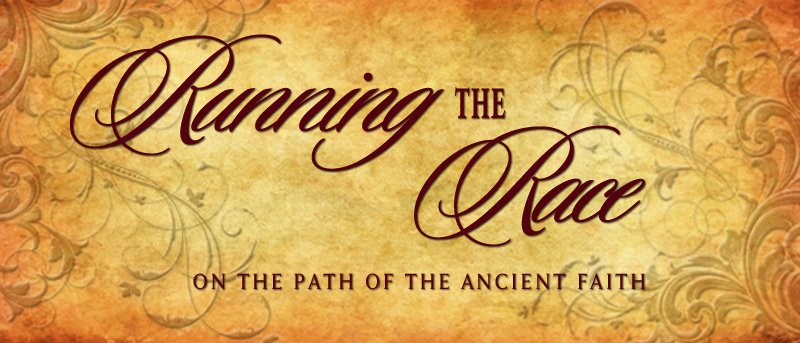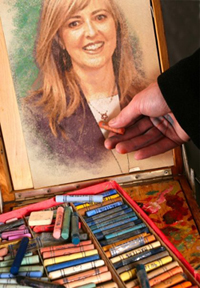Today is my Name Day
 Tuesday, November 30, 2010 at 9:09PM
Tuesday, November 30, 2010 at 9:09PM  Today, November 30th, is a special day. It’s my Name Day—a day set aside in the Orthodox Church to commemorate the Holy Apostle Andrew (my patron saint). In many countries, a name day celebration is a bigger deal than one’s birthday. Personally, I like having an excuse to celebrate on both days!
Today, November 30th, is a special day. It’s my Name Day—a day set aside in the Orthodox Church to commemorate the Holy Apostle Andrew (my patron saint). In many countries, a name day celebration is a bigger deal than one’s birthday. Personally, I like having an excuse to celebrate on both days!
Today didn’t start out feeling special. I worked, filled the car with gas, and went grocery shopping. At the end of a long day, I headed home, happy to call it a day. When I walked into the house, the first thing I saw was a small cake (with a dusting of coconut and chocolate flakes) centered on the dining room table and a card that read, “Mom.” It was then that I remembered, “It’s my name day!”
My thoughtful, wonderful, incredible daughter had baked a cake and written a lovely card to remember my special day. (I should also mention that a good friend--who is also Orthodox--bestowed me with a lovely flower bouquet last night in celebration of the occasion.) I am blessed!
Before I became Orthodox, I’d never heard of a “Name Day.” I had, however, heard of patron saints—although I couldn’t have told you what that was all about. As far as I knew, it was some kind of Roman Catholic thing (and therefore, to be disregarded by a good Protestant girl like me).
In the summer of 2006, as our family learned more about the Orthodox Church and its historic ties to the early church, I learned more about patron saints and their feast days (or name days).
“From the early days of Christianity, Christians were exhorted to take the names of prophets and saints by the authors of the first catechetical texts of the primitive church. It was also at this time that liturgies were universally celebrated in honor of the martyrs, apostles, and saints, when those having their names would commemorate them.”
Source
In the Orthodox Church, every day of the year is dedicated to the memory of at least one (usually more than one) saint or martyr. Catechumens (those preparing to enter the church through baptism and chrismation) are encouraged to select a patron saint prior to their baptism—usually a saint to whom they feel a special connection.
When I first learned about the life of Andrew, the “First Called” of the apostles, I was awestruck. Without being flippant, my reaction was, “He’s the man!” Now, it’s usually true that women (or girls) usually select patron saints of the female persuasion, but it’s not unheard of for a woman to select a male patron saint, as in my case. I was so incredibly moved and inspired by Andrew’s witness that I couldn’t think of anyone else I’d rather have as a spiritual “big brother.”
For Saint Andrew’s biography, read on:
The Holy Apostle Andrew the First-Called
Andrew, the son of Jonah and brother of Peter, was born in Bethsaida and was a fisherman by trade. At first he was a disciple of Saint John the Baptist, but when Saint John pointed to the Lord Jesus, saying, “Behold the Lamb of God!” (John 1:36), Andrew left his first teacher and followed Christ.
Saint Andrew, like his brother Saint Peter, was a fisherman. His love of the sea stemmed from his love of the Creator who made it, and the perils of the sea which he challenged daily forged the character with which he boldly assailed the seas of ignorance and paganism in the sacred trust that had been placed in his keeping.
Saint Andrew accepted Christ with all his heart and went forth to become one of the greatest missionaries in all history. When the apostles drew lots to determine their sphere of labor for the Saviour, Saint Andrew exulted in his mission to preach in Asia Minor, part of Greece, and an area along the coast of the Black Sea, including its gateway, the city now known as Istanbul, or Constantinople.
Wherever Saint Andrew went, he attracted throngs of people who thirsted for a spiritual knowledge. His message of deliverance was so eloquently convincing, even to hostile minds, that he is credited with having converted countless thousands to Christianity in a day when mass media did not exist. As an apostle, his only tools were his power of oratory and his love for Jesus, and his only press agent was the word of mouth of those privileged to hear his homilies.
Saint Andrew alone is credited with having set up parishes throughout Asia Minor, in Pontos, Bithynia, Thrace, Macedonia, Greece, Scythia (Russia, where he is still regarded as patron saint) and in the capital city of Byzantium. It was in Byzantium that Saint Andrew ordained Stachys as first bishop of Byzantium (later Constantinople), thereby establishing an unbroken line of 270 patriarchs down to the present day Patriarch Bartholomew.
From Byzantium, Saint Andrew went on to more glory through his compelling oratory and power of healing through Jesus Christ. He eventually found himself in Achaia, in the city of Patras, where he was to suffer death.
Saint Andrew committed the grave crime in the eyes of the state of converting Maximilla, wife of the ruler Aigeates, to Christianity. Despite the fact that he was then eighty years old, it was ordered that he be put to death by being nailed upside down to an X-shaped cross. While the apostle of Christ was still alive on the cross, he gave beneficial instructions to the Christians who had gathered around. The people wanted to take him down from the cross but he refused to let them. Then the apostle prayed to God and an extraordinary light encompassed him.
This brilliant illumination lasted for half an hour, and when it disappeared, the apostle gave up his holy soul to God after three days of agony on this vile device. The great fisherman had cast his net for Christ for the last time. Saint Andrew's remains were brought to Constantinople two hundred years later and in 1460 his head was given to the pope. On 24 September 1964, in an ecumenical gesture, the head was returned to the people of Patras by the pope.
“Pray unto God for me, O Holy Saint Andrew, well-pleasing to God: for I turn unto thee, who art the speedy helper and intercessor for my soul.” *
* Graffiti in the Catacombs bear witness to the fact that the saints were invoked by early Christians. For example, in the catacomb of Saint Sebastian invocations such as "Paul, Peter, pray for Erote, intercede" and Paul, Peter, pray for Victor", are clearly inscribed on the walls. There is evidence from very early times of Christian belief in intercession, from the archaeology of the Holy Land, the catacombs, Apocryphal writings and the early Fathers of the Church. Who knew?!




Reader Comments